 This was a dicey proposition from the press release alone. The exact wording that left me feeling uneasy was “it is a concept album made up of one epic 40-minute song”. What the heck? Did the Insomnium guys get confused and show up to Moonsorrow’s rehearsal space, shrug their shoulders and say “Screw it!”? This was such uncharted territory for a band who despite delivering consistently cohesive albums on a sonic and lyrical level (in aesthetic values at the least), is not exactly known for writing full blown, narrative-driven concept albums. Insomnium has always operated in a broad, expansive thematic field, their lyrical subject matter able to deftly shift between plainly written outpourings of introverted despair or the usage of folk allegory and natural imagery to communicate an intensely personal feeling. Their best album, 2011’s One For Sorrow, was a shifting, undulating collection of light and shade, moods and temperaments across a collection of songs about the memory of loss and the ache of loneliness. But this new album Winter’s Gate, their seventh overall, is based on a short story by vocalist/bassist Niilo Sevänen about a band of vikings that set out to discover a fabled island west of Ireland as winter approaches. Word is that Sevänen actually won a few literary awards for the original Finnish version of the short story, so its got some literary academia cred behind it. But even the finest storytelling won’t amount to much in the context of a metal album if the music doesn’t pull you in, let alone a singular forty minute track… and on that note, a bit of clarity is needed.
This was a dicey proposition from the press release alone. The exact wording that left me feeling uneasy was “it is a concept album made up of one epic 40-minute song”. What the heck? Did the Insomnium guys get confused and show up to Moonsorrow’s rehearsal space, shrug their shoulders and say “Screw it!”? This was such uncharted territory for a band who despite delivering consistently cohesive albums on a sonic and lyrical level (in aesthetic values at the least), is not exactly known for writing full blown, narrative-driven concept albums. Insomnium has always operated in a broad, expansive thematic field, their lyrical subject matter able to deftly shift between plainly written outpourings of introverted despair or the usage of folk allegory and natural imagery to communicate an intensely personal feeling. Their best album, 2011’s One For Sorrow, was a shifting, undulating collection of light and shade, moods and temperaments across a collection of songs about the memory of loss and the ache of loneliness. But this new album Winter’s Gate, their seventh overall, is based on a short story by vocalist/bassist Niilo Sevänen about a band of vikings that set out to discover a fabled island west of Ireland as winter approaches. Word is that Sevänen actually won a few literary awards for the original Finnish version of the short story, so its got some literary academia cred behind it. But even the finest storytelling won’t amount to much in the context of a metal album if the music doesn’t pull you in, let alone a singular forty minute track… and on that note, a bit of clarity is needed.
I’m not sure how all of you are consuming this album, but I got two copies —- somehow I landed a promo invite for this album thanks to a kind PR rep despite not being a regular for Century Media releases, and then my deluxe edition book arrived in the mail. So here’s the thing, on the physical edition of Winter’s Gate you get the album as one track at 40:02 in length, no cuts or segmentation at all —- yeeesh. However, on the promo copy, the album is divided up into chapters (titled “Winter’s Gate Pt. 1” and onwards through seven). This was curious, so I did some looking around and it turns out that perhaps the band or label was forced to make some cuts for the digital release of this album, and I wonder if its due to track length limitations on these various platforms such as iTunes or Spotify (perhaps caching such a long song is a problem?). Notice that audiobooks sold over iTunes are heavily segmented, even massive ones like The Silmarillion or the Game of Thrones stuff (maybe I’m way off on that theory, just speculating). What’s clear is that the band preferred to have this album consumed as one long, singular track ala Crimson by Edge of Sanity, their admitted inspiration for its structure (and perhaps not coincidentally, Dan Swano handles the mixing of this album!).
As for myself, faced with two options in listening experiences, I opted for convenience’s sake and went with the segmented digital copy. Firstly it would help me because often times in reviewing I’ll play the album straight through, and then go through it again in reverse order just to see if my opinion isn’t being strongly influenced by the first couple tracks (a long standing practice that isn’t talked about much publicly was/is to front load an album with what’s considered the best material and thus get the over burdened rock/metal press to peg glowing reviews, however skewed —- see Sepultura’s Roots). Anyway, that being the case, you might find it frustrating that I refer to particular sections of “Winter’s Gate” by the chapter instead of marking the time that you’d find in the 40:02 single player. I apologize in advance for that, but I do actually wish they’d sliced this up on the physical release a bit. I get why they chose not to, but if I only had the physical copy to play or rip to my laptop, it’d be a frustrating thing for me to get to my favorite chapter of the album, or a particularly awesome moment I really wanted to hear right then. That is a criticism I’m leveling at the band right away, because I applaud ambition (even if a forty minute song on paper sounds dreadful) and I love the guts it took to do something daring like this album when it could so easily backfire —- but a little detail like slicing the piece into skip-able sections shouldn’t be viewed as a concession to low attention spans in the iPod age, but simply as a considerate feature for your passionate fans.
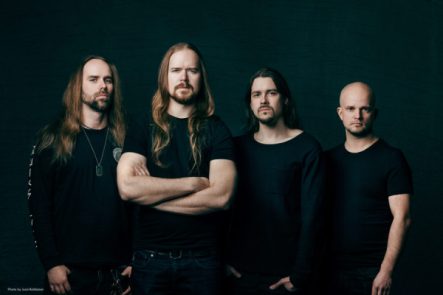 I’m happy to say that all my fears about what this album could have sounded like are allayed, and in fact, Winter’s Gate might just be Insomnium’s most gripping, powerful piece of music to date. It’d be pure speculation to suggest that it was a purposeful internal reaction to the somewhat mixed reception of 2014’s Shadows Of A Dying Sun, but it sounds like a band having a sense of urgency about their art. That idea of urgency is most vividly heard in the increase of raw brutality that streaks across the album like that bear’s paws across Leo’s back in The Revenant, barreling at us in the form of harsher, more guttural vocals by Sevänen, and a surprising second wave of Norwegian black metal injection that courses through much of this material. That particular facet begins straight away, where blastbeats and furious tremolo riffing combine in a violent musical bed over which more traditional Insomnium-esque lead guitar melodies spiral upon at a slightly slower tempo. In other words, its a merging of Finnish melo-death mournful melody and Norwegian black metal hypnosis into something truly unique, and you’ve never heard Insomnium sound this heavy or impactful before. Its a satisfying combo, particularly when they add in flourishes of Gothenburg, or let’s be more specific, Jesper Stromblad-ian speed-picking riff flurries as a just-as-frenetic yet lighter shade to the black metal furor. My first playthrough of the album had me grinning like an idiot only a few minutes in “Winter’s Gate Pt. 2”.
I’m happy to say that all my fears about what this album could have sounded like are allayed, and in fact, Winter’s Gate might just be Insomnium’s most gripping, powerful piece of music to date. It’d be pure speculation to suggest that it was a purposeful internal reaction to the somewhat mixed reception of 2014’s Shadows Of A Dying Sun, but it sounds like a band having a sense of urgency about their art. That idea of urgency is most vividly heard in the increase of raw brutality that streaks across the album like that bear’s paws across Leo’s back in The Revenant, barreling at us in the form of harsher, more guttural vocals by Sevänen, and a surprising second wave of Norwegian black metal injection that courses through much of this material. That particular facet begins straight away, where blastbeats and furious tremolo riffing combine in a violent musical bed over which more traditional Insomnium-esque lead guitar melodies spiral upon at a slightly slower tempo. In other words, its a merging of Finnish melo-death mournful melody and Norwegian black metal hypnosis into something truly unique, and you’ve never heard Insomnium sound this heavy or impactful before. Its a satisfying combo, particularly when they add in flourishes of Gothenburg, or let’s be more specific, Jesper Stromblad-ian speed-picking riff flurries as a just-as-frenetic yet lighter shade to the black metal furor. My first playthrough of the album had me grinning like an idiot only a few minutes in “Winter’s Gate Pt. 2”.
And it was right around that time where we are treated to our first tastes of a more recognizable, classic Insomnium sound (approximately 8:43 for you folks with the single track), with guitarists Ville Friman and Markus Vanhala abruptly shifting away from a staggeringly brutal passage into a flowing, beautifully written, lilting open chord sequenced solo over chiming acoustic guitar. We also get our first dose of Friman’s excellent clean vocals, suitably downcast in tone but still built on tuneful melodies and helped along by his perfect enunciation that pairs well with only the slightest tinge of an accent. This chapter ends with swirling, long guitar sustains, like leaves stirred up by gusts of autumnal winds, quietly falling into a hush from which rises “Winter’s Gate Pt.3” (at the 12:52 mark). This section really reminded me of Porcupine Tree, not only for the syncopated rhythm section with playfully bouncy bass and dancing guitar lines, but for the paintbrush strokes of keyboard generated atmospherics that move in and out of audible range like waves lapping a shoreline. Vanhala has mentioned in interviews to referring to this chapter’s guitar solo as his “Dire Straits moment”, and its easy to hear why he’s characterizing it as such. It caps off an overall lovely 5:52 minutes of delicate musicality largely built upon progressive rock touchstones and dynamics (I say delicate because even Sevänen’s harsh vocals are a little more subdued when he comes back in towards the end).
Its not only a welcome musical interlude that is engaging and oddly comforting, but it sets up my favorite moment of the album in “Winter’s Gate Pt.4” (begins at the 18:45 mark). Friman has steadily been growing in confidence as a clean vocalist since his work on One For Sorrow, with his largest leaps marking some of Shadows of a Dying Sun’s finest moments (“Lose To Night”), and on this particular chapter he fully realizes his potential. His clean vocals during this section range from Mikael Akerfeldt earthiness in the beginning of the chapter (“Still I bear the flowers…”) to near Pink Floydian epic layering towards the chapter’s emotional crescendo (“I walk with my head down…”). Listen to this chapter with headphones, because there’s some impressive acoustic guitar work going on underneath all the heavy layers of riffs and aggressive vocals that absolutely needs to be heard. I also love the sombre, twilight conjuring use of piano to mark the beginning of “Winter’s Gate Pt.5”, as the instrument is an Insomnium staple at this point and it’d be strange not to hear it. What it introduces is the march towards some of the most dark, intensely heavy music the band has ever done —- cue up 29:36 where a classic Insomnium bittersweet melody unfurls into a blisteringly fierce section, Sevänen’s vocals delving down into previously unheard death-doom territory over tremolo riff sequences.
 By the time we reach the concluding “Winter’s Gate Pt.7”, we’re somehow still not ready for the sheer violence that the band plunges you ear first in (specifically at the 34:31 mark), with Sevänen’s vocals exhanging guttural death-metal for the coarse, wind-strained harsh black metal barking more associated with Enslaved’s Grutle Kjellson. If you’re following along with the lyrics and the storyline in general, this is around the time when it all hits the fan for our viking friends, but even if you’re not, the urgency and sense of madness conveyed by this awesome, eye-opening sequence is certainly heart pounding. The guitar work is inspired and tremendous, and the implementation of tremolo riffing isn’t a gimmick, it really does have a way of getting your hackles up as a listener —- funny how so many black metal bands never learned that tremolo picked passages work best when used alongside tempo accelerations and shifts and counterpoints… a melo-death band from Finland seems to understand that intuitively. If you want another example of tremolo passages being used in non-black metal music to powerful effect, check out Sweden’s own Falconer on their Armod album.
By the time we reach the concluding “Winter’s Gate Pt.7”, we’re somehow still not ready for the sheer violence that the band plunges you ear first in (specifically at the 34:31 mark), with Sevänen’s vocals exhanging guttural death-metal for the coarse, wind-strained harsh black metal barking more associated with Enslaved’s Grutle Kjellson. If you’re following along with the lyrics and the storyline in general, this is around the time when it all hits the fan for our viking friends, but even if you’re not, the urgency and sense of madness conveyed by this awesome, eye-opening sequence is certainly heart pounding. The guitar work is inspired and tremendous, and the implementation of tremolo riffing isn’t a gimmick, it really does have a way of getting your hackles up as a listener —- funny how so many black metal bands never learned that tremolo picked passages work best when used alongside tempo accelerations and shifts and counterpoints… a melo-death band from Finland seems to understand that intuitively. If you want another example of tremolo passages being used in non-black metal music to powerful effect, check out Sweden’s own Falconer on their Armod album.
Something we should consider on the guitar front is Vanhala’s longer period of time within the lineup, he is in fact a co-songwriter all through the album, contributing to the music alongside Friman and Sevänen. Friman used to handle most of the music by himself, but he seemed stretched thin in spots for Shadows with some notable exceptions. I wonder if Vanhala’s integration in the music writing was the catalyst for injecting some much needed change with the way the guitar riffs and passages were envisioned and written (Vanhala is the primary songwriter for Omnium Gatherum whose music is considerably more uptempo and frenetic than Insomnium’s… well, until now perhaps). I’m absolutely thrilled that Insomnium pulled off the improbable here, and dare I suggest that they’ve made one of the most complete albums of the year. Its nicely concise, something I think the band needed after spending a decade in 55 minute plus territory through most of their albums, and despite the single track on the physical release being a significant flaw, the music here is strong enough to lock in most attention spans. Insomnium are a rather smart, intellectual bunch (check their bios), so credit to them for realizing that they had to shake things up somehow, even if that meant doing so in the riskiest way possible.

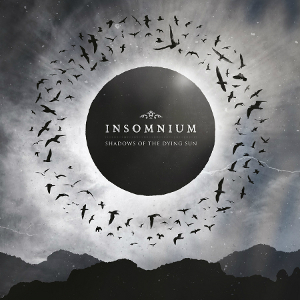 Finland’s melodic death metal brush artists Insomnium are perhaps my most beloved metal “discovery” within the past few years. I stumbled across them some time after the release of their 2011 album One For Sorrow, an elegiac, melancholy touched masterpiece. I think its easy for writers to throw that term around often, it happens quite a bit within metal reviewer circles —- but I really mean it in relation to that album. I was transfixed by every note within, and when I worked my way backwards through their discography, eagerly devouring the similarly styled Across the Dark (2009) and the noticeably more aggressive Above the Weeping World (2006), my appreciation for the band grew stronger and deeper. By October of 2012 I had my first opportunity to see the band live, who had an opening slot for Alestorm (the very idea) and Epica. I’ll never forget that show, I wrote earnestly about my experience that night in an admittedly unnoticed
Finland’s melodic death metal brush artists Insomnium are perhaps my most beloved metal “discovery” within the past few years. I stumbled across them some time after the release of their 2011 album One For Sorrow, an elegiac, melancholy touched masterpiece. I think its easy for writers to throw that term around often, it happens quite a bit within metal reviewer circles —- but I really mean it in relation to that album. I was transfixed by every note within, and when I worked my way backwards through their discography, eagerly devouring the similarly styled Across the Dark (2009) and the noticeably more aggressive Above the Weeping World (2006), my appreciation for the band grew stronger and deeper. By October of 2012 I had my first opportunity to see the band live, who had an opening slot for Alestorm (the very idea) and Epica. I’ll never forget that show, I wrote earnestly about my experience that night in an admittedly unnoticed 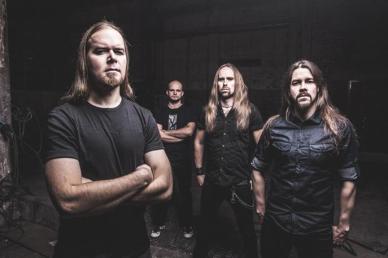 I tell you all that not only to rectify the lack of detail in that older Insomnium/Sentenced article, but to express to you just how deep my personal roots have grown with this band. I’m writing an album review on the surface, but I’m almost pained to write one for fear of deconstructing the album past the point of —- well, the way I want to enjoy it. In keeping with the way I handled my previous review, for Sabaton’s Heroes, I’ll just come right out and declare this: This is a great Insomnium record, filled with the kind of emotionally charged songwriting and artistry that we now expect from the band. But then haven’t I already expressed that I felt their past three albums were great? Yes I have, and if that nullifies any sense of relative objectivity for you then I’m sorry. And really, what else can I say? This is a band on a roll, with an unshakeable sense of identity and a musical nucleus of guitarist/vocalist Ville Friman and vocalist/bassist Niilo Sevanen that is perhaps the strongest in melodic death metal since the Stromblad-Gelotte pairing during the classic In Flames era.
I tell you all that not only to rectify the lack of detail in that older Insomnium/Sentenced article, but to express to you just how deep my personal roots have grown with this band. I’m writing an album review on the surface, but I’m almost pained to write one for fear of deconstructing the album past the point of —- well, the way I want to enjoy it. In keeping with the way I handled my previous review, for Sabaton’s Heroes, I’ll just come right out and declare this: This is a great Insomnium record, filled with the kind of emotionally charged songwriting and artistry that we now expect from the band. But then haven’t I already expressed that I felt their past three albums were great? Yes I have, and if that nullifies any sense of relative objectivity for you then I’m sorry. And really, what else can I say? This is a band on a roll, with an unshakeable sense of identity and a musical nucleus of guitarist/vocalist Ville Friman and vocalist/bassist Niilo Sevanen that is perhaps the strongest in melodic death metal since the Stromblad-Gelotte pairing during the classic In Flames era. The next two tracks, “Revelation” and “Black Heart Rebellion” are as starkly contrasting as day and night; the former is a dreamy blend of acoustic guitars and slower, patient tempos with crescendoing clean electric melodic runs, Sevanen’s vocal performance at times softening to a near spoken word whisper. Its a startlingly spiritual lyric at work here too, a Sevanen penned hymn that seems to touch on the Cosmos-themed concepts of being aware of one’s own place in the universe, that “This is the gift of man / The key to see it all / The hidden wonders / Hope in despair”. Alternately in both music and lyrics, “Black Heart Rebellion” is perhaps the most punishing and brutal track on the album, with its black metal like flurry of near tremolo riffs, blastbeat percussive tempos, and Sevanen’s vicious growling about the parallels between “Morning star, angel of the dawn” and “Desolate is the path of self-believers”. Yet Friman still writes in moments of space for quiet melodic reflections, such as Vanhala’s hushed solo at 4:53 —- the kind of thing that is such a distinctive Insomnium signature, their musical calling card if you will. The lengthiest track on the album is the similarly black metal-touched “The River”, where I love the way the guitars anticipate the vocals by a fraction of a second at the 1:27 mark and the resulting effect crackles with excitement. Those stately verse sections unleash into a tremolo riff fueled chorus section with some surprising melodic change-ups.
The next two tracks, “Revelation” and “Black Heart Rebellion” are as starkly contrasting as day and night; the former is a dreamy blend of acoustic guitars and slower, patient tempos with crescendoing clean electric melodic runs, Sevanen’s vocal performance at times softening to a near spoken word whisper. Its a startlingly spiritual lyric at work here too, a Sevanen penned hymn that seems to touch on the Cosmos-themed concepts of being aware of one’s own place in the universe, that “This is the gift of man / The key to see it all / The hidden wonders / Hope in despair”. Alternately in both music and lyrics, “Black Heart Rebellion” is perhaps the most punishing and brutal track on the album, with its black metal like flurry of near tremolo riffs, blastbeat percussive tempos, and Sevanen’s vicious growling about the parallels between “Morning star, angel of the dawn” and “Desolate is the path of self-believers”. Yet Friman still writes in moments of space for quiet melodic reflections, such as Vanhala’s hushed solo at 4:53 —- the kind of thing that is such a distinctive Insomnium signature, their musical calling card if you will. The lengthiest track on the album is the similarly black metal-touched “The River”, where I love the way the guitars anticipate the vocals by a fraction of a second at the 1:27 mark and the resulting effect crackles with excitement. Those stately verse sections unleash into a tremolo riff fueled chorus section with some surprising melodic change-ups. I have other favorites as well, “The Promethean Song” being chief among them, its chiming acoustics and slow tempo-ed bed of bass heavy guitars preceding a Sevanen/Friman vocal trade off where the latter opens up his pipes to higher ranges than we’ve seen from him before. He sounds good, really good actually, and he knows how to write vocal melodies that suit his tone (a rare skill in guitarist first songwriters). I adore the bridge section that occurs at the 4:00 minute mark with accented drumming, Sevanen’s harshly barked out vocals and perhaps the album’s best guitar solo. Then there’s the title track serving as the album closer, its a bass driven, rumbling beast of a song where heavy guitars suddenly swing up and crunch down to usher in a rather inspired Sevanen / Friman vocal duet on the refrain, “And I feel it in my heart / And I know it in my mind / That’s all there is, ever will be”. Its another song where Friman ruminates upon the stardust-y nature of our existence, a sentiment I entertain myself with on occasion and feel rather connected to. Incidentally, Friman makes his rent by working a day job as a scientific researcher, so if you’ve been wondering at the inclusion of science meets spirituality themes within the lyrics, that goes a long way towards explaining it. And of course there’s “Ephemeral”, which we heard late last year as a standalone single, and its dressed up here in a few more layers of guitars and production work, but still sounds just as vibrant, fresh, and ear wormingly catchy as it did originally. It features my favorite lyric on the album, “Dying doesn’t make this world dead to us / Breathing doesn’t keep the flame alive in us”, and its a rarity among Insomnium’s catalog —- a truly anthemic song.
I have other favorites as well, “The Promethean Song” being chief among them, its chiming acoustics and slow tempo-ed bed of bass heavy guitars preceding a Sevanen/Friman vocal trade off where the latter opens up his pipes to higher ranges than we’ve seen from him before. He sounds good, really good actually, and he knows how to write vocal melodies that suit his tone (a rare skill in guitarist first songwriters). I adore the bridge section that occurs at the 4:00 minute mark with accented drumming, Sevanen’s harshly barked out vocals and perhaps the album’s best guitar solo. Then there’s the title track serving as the album closer, its a bass driven, rumbling beast of a song where heavy guitars suddenly swing up and crunch down to usher in a rather inspired Sevanen / Friman vocal duet on the refrain, “And I feel it in my heart / And I know it in my mind / That’s all there is, ever will be”. Its another song where Friman ruminates upon the stardust-y nature of our existence, a sentiment I entertain myself with on occasion and feel rather connected to. Incidentally, Friman makes his rent by working a day job as a scientific researcher, so if you’ve been wondering at the inclusion of science meets spirituality themes within the lyrics, that goes a long way towards explaining it. And of course there’s “Ephemeral”, which we heard late last year as a standalone single, and its dressed up here in a few more layers of guitars and production work, but still sounds just as vibrant, fresh, and ear wormingly catchy as it did originally. It features my favorite lyric on the album, “Dying doesn’t make this world dead to us / Breathing doesn’t keep the flame alive in us”, and its a rarity among Insomnium’s catalog —- a truly anthemic song. Sunday, September 22nd, marked the official Autumnal equinox, and even though the temperatures here in Houston will still reach the 90s this week, there were signs in the air that the seasons had truly changed. It was in the sounds of an NFL Sunday escaping from the television, the outdoor smells of burning wood and grilling meats, the sights of a grey, overcast sky, and of course, the feel of much cooler breezes. In case you haven’t noticed, I’m pretty big on this time of the year, and of course I tend to gravitate to listening to those bands that tend to provide a suitable Fall soundtrack. One of these bands is Insomnium, whom I began to get into heavily
Sunday, September 22nd, marked the official Autumnal equinox, and even though the temperatures here in Houston will still reach the 90s this week, there were signs in the air that the seasons had truly changed. It was in the sounds of an NFL Sunday escaping from the television, the outdoor smells of burning wood and grilling meats, the sights of a grey, overcast sky, and of course, the feel of much cooler breezes. In case you haven’t noticed, I’m pretty big on this time of the year, and of course I tend to gravitate to listening to those bands that tend to provide a suitable Fall soundtrack. One of these bands is Insomnium, whom I began to get into heavily 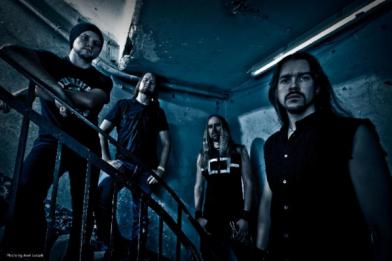 This single release is actually an EP to be precise, a collection of four tracks, the aforementioned “Ephemeral” and three acoustic based instrumental tracks. The title track kicks us off; a just under four minute slice of tempered Insomnium styled melo-death and its our first taste of the band’s slightly different take on their sound. Noticeably there is a lack of the band’s usual penchant for a slower, lengthy musical intro —- before we know it we’re launching headlong into a twice repeating up tempo verse section that accelerates into a nicely worked bridge, before exploding with a gush of ultra melodic guitars in the chorus. Whats striking here is the interesting tempo progression, a rhythmically uptempo verse to be sure, followed by an even faster bridge, and finally the guitars take the lead in the chorus to push the song to the speed limit. As usual for a band of their songwriting talent, Insomnium’s keen ear at layer separation between instruments is the key attribute at work here —- notice that the vocals continue from section to section at their own pace, never feeling the need to match the rhythm section or guitar leads. This song is catchy as hell. Probably more than any other melo-death band, Insomnium seems to have a never ending supply of ear worms that they liberally sprinkle all throughout their songwriting.
This single release is actually an EP to be precise, a collection of four tracks, the aforementioned “Ephemeral” and three acoustic based instrumental tracks. The title track kicks us off; a just under four minute slice of tempered Insomnium styled melo-death and its our first taste of the band’s slightly different take on their sound. Noticeably there is a lack of the band’s usual penchant for a slower, lengthy musical intro —- before we know it we’re launching headlong into a twice repeating up tempo verse section that accelerates into a nicely worked bridge, before exploding with a gush of ultra melodic guitars in the chorus. Whats striking here is the interesting tempo progression, a rhythmically uptempo verse to be sure, followed by an even faster bridge, and finally the guitars take the lead in the chorus to push the song to the speed limit. As usual for a band of their songwriting talent, Insomnium’s keen ear at layer separation between instruments is the key attribute at work here —- notice that the vocals continue from section to section at their own pace, never feeling the need to match the rhythm section or guitar leads. This song is catchy as hell. Probably more than any other melo-death band, Insomnium seems to have a never ending supply of ear worms that they liberally sprinkle all throughout their songwriting. There are three other cuts on this EP, as mentioned before, they are short atmospheric, acoustic instrumentals that actually served as the soundtrack to their One For Sorrow documentary. And before you yawn, let me assure you that they work within the context of this release. I suppose the obvious thing would be to say they were soothing, and at times they were, but “The Swarm” kicks off with a Jester Race sounding acoustic strum that is almost waltz-like in its tempo, bringing to mind the best era of that famed Gothenburg sound. They’re all good pieces, and nice to have in addition to the main attraction, but I think it would have been far more interesting had they re-recorded a few tracks from their back catalog in an acoustic format, perhaps with clean vocals over them? Ah can’t win them all. Regarding the documentary, I loved every minute of it, and its starkness in tone matched the band’s musical qualities, right down to the directorial decisions —- its worth checking out on YouTube. That coupled with the new single has me more anticipatory than ever, could a new album possibly arrive before year’s end? If not at least Autumn is finally here.
There are three other cuts on this EP, as mentioned before, they are short atmospheric, acoustic instrumentals that actually served as the soundtrack to their One For Sorrow documentary. And before you yawn, let me assure you that they work within the context of this release. I suppose the obvious thing would be to say they were soothing, and at times they were, but “The Swarm” kicks off with a Jester Race sounding acoustic strum that is almost waltz-like in its tempo, bringing to mind the best era of that famed Gothenburg sound. They’re all good pieces, and nice to have in addition to the main attraction, but I think it would have been far more interesting had they re-recorded a few tracks from their back catalog in an acoustic format, perhaps with clean vocals over them? Ah can’t win them all. Regarding the documentary, I loved every minute of it, and its starkness in tone matched the band’s musical qualities, right down to the directorial decisions —- its worth checking out on YouTube. That coupled with the new single has me more anticipatory than ever, could a new album possibly arrive before year’s end? If not at least Autumn is finally here.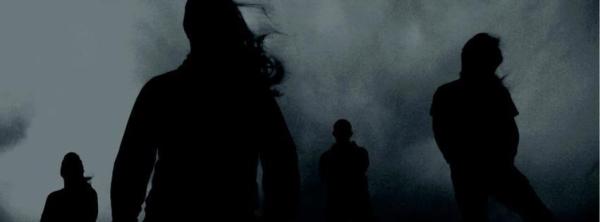
 Symmetry is an interesting thing. Alongside Insomnium, lately I’ve been finding myself listening again to albums by one of my favorite and now long defunct Finnish bands, Sentenced. I realized that the album that introduced me to those manic Finns was 2002’s The Cold White Light, a near perfect collection of songs that I can still listen to all the way through to this day and feel the same magic that I felt back in ’02. As such, there exists a neatly wrapped decade’s worth of time separating my introduction to both Sentenced and Insomnium, two Finnish bands that share more in common that just my personal anniversaries. What I loved about Sentenced was their ability to create beautifully melancholic melodic metal that despite its occasional tongue-in-cheekiness, could be extremely emotional at a very deep level. It wasn’t even about the lyrics, which were simple, effective and poignant, but more about the sweep and scope provided through the songwriting, and the uncanny ability of how something as normal as a guitar melody or solo could evoke feelings of loneliness and isolation.
Symmetry is an interesting thing. Alongside Insomnium, lately I’ve been finding myself listening again to albums by one of my favorite and now long defunct Finnish bands, Sentenced. I realized that the album that introduced me to those manic Finns was 2002’s The Cold White Light, a near perfect collection of songs that I can still listen to all the way through to this day and feel the same magic that I felt back in ’02. As such, there exists a neatly wrapped decade’s worth of time separating my introduction to both Sentenced and Insomnium, two Finnish bands that share more in common that just my personal anniversaries. What I loved about Sentenced was their ability to create beautifully melancholic melodic metal that despite its occasional tongue-in-cheekiness, could be extremely emotional at a very deep level. It wasn’t even about the lyrics, which were simple, effective and poignant, but more about the sweep and scope provided through the songwriting, and the uncanny ability of how something as normal as a guitar melody or solo could evoke feelings of loneliness and isolation.
 Sentenced were a remarkable band, underrated to this day and worse of all, they seemed to call it quits just as they were achieving great things artistically. Their 2005 release. The Funeral Album, was their swan song and it was every bit as awesome as its predecessor. Miika Tenkula, their lead guitarist and primary songwriter, was the heart and soul of the band — and it was his voice that underscored nearly every song they wrote. When he passed away in 2009, only thirty-four years young, I hardly found it shocking to read that he had a serious drinking problem that apparently got worse after the band ended. The raw emotion and pain within their music had to really come from somewhere true — sadly that is. I wondered if there would ever be a band that could provide me with that particular fix that Sentenced so effortlessly delivered. There is — I believe their countrymen in Insomnium are the spiritual successors to the musical legacy that Sentenced chose to leave behind.
Sentenced were a remarkable band, underrated to this day and worse of all, they seemed to call it quits just as they were achieving great things artistically. Their 2005 release. The Funeral Album, was their swan song and it was every bit as awesome as its predecessor. Miika Tenkula, their lead guitarist and primary songwriter, was the heart and soul of the band — and it was his voice that underscored nearly every song they wrote. When he passed away in 2009, only thirty-four years young, I hardly found it shocking to read that he had a serious drinking problem that apparently got worse after the band ended. The raw emotion and pain within their music had to really come from somewhere true — sadly that is. I wondered if there would ever be a band that could provide me with that particular fix that Sentenced so effortlessly delivered. There is — I believe their countrymen in Insomnium are the spiritual successors to the musical legacy that Sentenced chose to leave behind.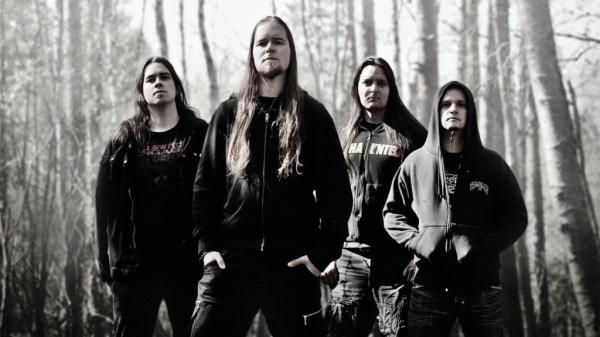


 One more thing I’ve stumbled upon late this summer is that I completely slept on the incredibly beautiful 2011 album One For Sorrow by Finland’s Insomnium. Had I been paying more attention to the suggestions of several people last year and given it a listen, it would have been an easy shoe in for a place on
One more thing I’ve stumbled upon late this summer is that I completely slept on the incredibly beautiful 2011 album One For Sorrow by Finland’s Insomnium. Had I been paying more attention to the suggestions of several people last year and given it a listen, it would have been an easy shoe in for a place on